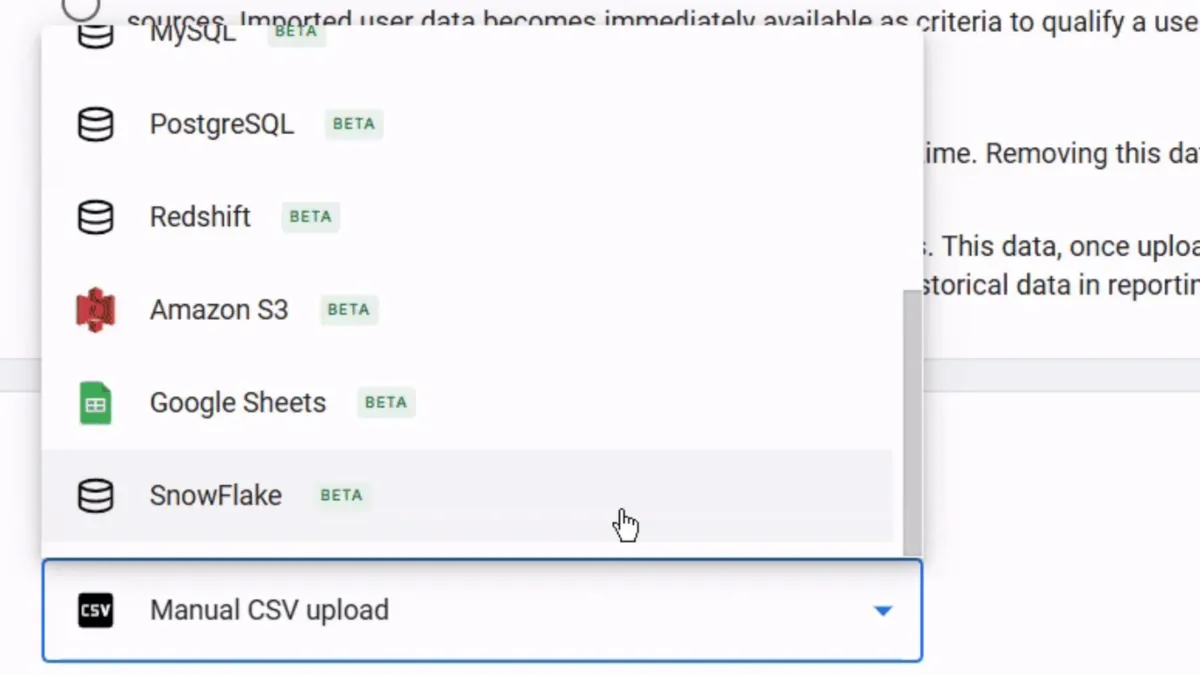
Google Analytics 4 announced on June 24, 2025, the expansion of its cost data import feature to include nine additional data sources in open beta. The enhancement allows marketers to consolidate advertising spend data from multiple platforms into a single analytics interface.
The new supported sources comprise Google Sheets, Amazon Redshift, Amazon S3, BigQuery, Google Cloud Storage, HTTPS, MySQL, PostgreSQL, and Snowflake. This expansion significantly broadens the platform's data integration capabilities beyond previous limitations.
Digital marketers previously relied on manual processes or third-party tools to aggregate cost data from multiple advertising platforms. The updated functionality enables automated data integration from various sources, streamlining cross-platform performance analysis.
Get the PPC Land newsletter ✉️ for more like this.
Summary
Who: Google Analytics 4 users, digital marketers, and advertising professionals seeking cross-platform cost data integration
What: Expansion of cost data import functionality to support nine new data sources including BigQuery, Amazon platforms, and various database systems
When: Announced June 24, 2025, currently available in open beta
Where: Available globally through Google Analytics 4 platform interface and API integrations
Why: To address marketer needs for unified advertising spend analysis across multiple platforms and improve cross-channel performance measurement capabilities
According to the announcement from Google, users can access imported cost data through the Acquisition > Non Google cost report and the Planning > All channels report within the Advertising workspace. This dual-report system provides comprehensive visibility into advertising investments across different channels.
The technical implementation requires specific configuration steps for each data source type. According to the platform documentation, file-based sources including HTTPS, Google Sheets, Google Cloud Storage, and Amazon S3 must provide data in CSV or TSV format. Database connections to Amazon Redshift, BigQuery, MySQL, PostgreSQL, and Snowflake require proper authentication credentials and network accessibility.
Data import processing maintains existing timeframes. According to Google's technical specifications, imported cost data requires up to 24 hours to become available in reports and audience configurations after upload completion.
The database integrations include specific technical requirements. MySQL and PostgreSQL implementations require internet-accessible databases with proper username and password authentication. Amazon Redshift connections need databases accessible over the internet with appropriate user permissions for data access.
Google Cloud Storage and Amazon S3 implementations follow different authentication protocols. Google Cloud Storage requires GCP roles with write permissions on GCS buckets and Google Ads administrative access for initial connection setup. Amazon S3 needs AWS Identity Access Management principals with object upload permissions and API key generation capabilities.
Snowflake integration demands account credentials with access to relevant data tables. According to the documentation, users can create accounts with limited access specifically for Google Analytics integration purposes while maintaining security protocols.
The enhanced functionality addresses long-standing limitations in cross-platform advertising measurement. PPC Land previously reported that Google Analytics simplified cost data import requirements in February 2025, reducing mandatory fields from five to three core parameters: source, medium, and date.
BigQuery integration represents a significant advancement for enterprise users. The connection requires GCP owner access on the BigQuery project and Google Ads admin access for initial setup. According to the technical documentation, admin access can be revoked once the connection is established, maintaining security protocols.
The HTTPS data source option enables integration with custom data feeds. This source type requires specific URL patterns following https://[ip|domain]/path/filename.[csv|tsv] format with username and password authentication for secure data access.
Technical constraints remain consistent across all new data sources. According to Google's documentation, users can maintain only one data source per cost data import configuration. Data formatting requirements specify cost values in 0,000.00 format and dates following ISO 8601 standards (YYYY-MM-DD).
The beta status indicates ongoing development and potential modifications. Google's announcement specifies that all nine new data sources are "part of an open beta and subject to change." This designation suggests continued refinement based on user feedback and technical performance metrics.
Error handling procedures vary by data source type. Amazon Redshift and PostgreSQL implementations include specific troubleshooting guidance for connection failures, typically related to database permissions or network accessibility issues. Amazon S3 error resolution focuses on access key authentication and object naming conventions.
The expansion reflects broader industry trends toward unified marketing analytics platforms. According to PPC Land's analysis, Google Analytics previously enhanced cost data import functionality in November 2024 to better handle unmatched data and improve campaign metrics importation.
Implementation timing varies across different data source types. Database connections like BigQuery and Snowflake require more complex setup procedures compared to file-based sources such as Google Sheets or CSV uploads via HTTPS endpoints.
Security considerations differ among the various data sources. Cloud storage platforms require specific IAM configurations and access permissions. Database connections need proper credential management and network security protocols to ensure secure data transmission.
The update maintains backward compatibility with existing cost data import configurations. Previous implementations continue functioning without modification while providing access to the expanded data source options for new configurations.
Data processing capabilities handle large-scale enterprise requirements. According to the technical specifications, the system supports daily data import and scheduling of daily import refreshes across all supported data source types.
Integration with Google's advertising ecosystem provides additional functionality. The imported cost data becomes available for use in audience creation, campaign optimization, and cross-platform performance analysis within Google's marketing tools.
Timeline
• June 24, 2025: Google Analytics announces nine new data sources for cost data import in open beta
February 2025: Google Analytics simplifies cost data import requirements to three mandatory fields
November 2024: Google Analytics enhances cost data import functionality to better track unmatched data
September 2024: Google Analytics introduces multiple data sources support for each import type
June 2024: Google Analytics launches custom event data import functionality


